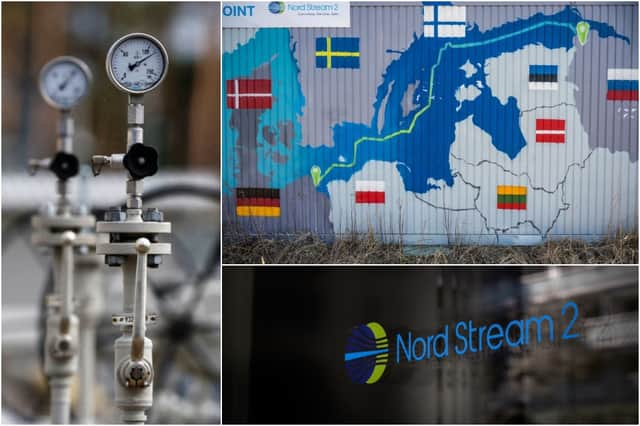Nord Stream: were gas pipeline 1 and 2 leaks sabotage, is Russia to blame, map - and explosions explained


A series of unusual leaks on two natural gas pipelines running from Russia to Germany beneath the Baltic Sea have raised worries about sabotage.
This week, the Nord Stream 1 pipeline from Russia to Europe reported a drop in pressure, just hours after a leak in the Nord Stream 2 pipeline off the coast of Denmark was discovered.
Advertisement
Hide AdAdvertisement
Hide AdWhile the Nord Stream 2 pipeline has never been fully operational, Nord Stream 1 had been carrying gas to Germany until earlier this month, when Russian energy giant Gazprom cut off the supply, claiming there was a need for urgent maintenance work to repair key components.
Despite not delivering gas to Europe, both pipelines have still been filled with gas, German news agency dpa reported.
Here is everything you need to know about it.
What happened?
On Monday (26 September), the Nord Stream 1 pipeline from Russia to Europe reported a drop in pressure, only hours after a leak was reported in the Nord Stream 2 pipeline in the Baltic Sea off the coast of Denmark.
“We are investigating this incident as well, together with the authorities concerned and the Federal Network Agency,” the German economy ministry said in a statement. “We currently do not know the reason for the drop in pressure.”
Advertisement
Hide AdAdvertisement
Hide AdThen, on Tuesday (27 September), the Swedish Maritime Administration said two leaks were discovered in Nord Stream 1, which partly runs in Swedish waters. Danish authorities confirmed the leaks.


The Danish Maritime Authority issued a navigation warning to ships, and established a prohibited area to ensure that vessels do not sail near the leaks.
Danish authorities said ships may lose buoyancy if they sail into the area, and there may also be a risk of the ignition of leaked gas above the water and in the air.
Why are the pipelines important?
The pipelines have been at the centre of an energy war between Europe and Russia since the invasion of Ukraine in late February.
Advertisement
Hide AdAdvertisement
Hide AdA drop in Russian gas supplies has caused energy prices to soar, causing pain for many across Europe and creating fears about the coming winter and putting pressure on governments to help ease soaring bills.
While Nord Stream 2 has never been operational, Nord Stream 1 had delivered gas to Germany until earlier this month, when Russian energy giant Gazprom turned off the supply, alleging that urgent maintenance work was required to replace vital components.
Gazprom’s citing of technical problems have been rejected by German officials as a cover for a political power play following Russia’s invasion of Ukraine.
Gazprom started cutting supplies through Nord Stream 1 in mid-June, blaming delays to the delivery of a turbine that had been sent to Canada for repair.
Advertisement
Hide AdAdvertisement
Hide AdThe Nord Stream 2 gas pipeline was already complete when German Chancellor Olaf Scholz suspended its certification on the eve of Russia’s invasion of Ukraine in February, after Russia formally recognised two Russian-backed breakaway regions in eastern Ukraine.


Were the pipelines sabotaged?
Leaders of Poland and Denmark and experts have raised concerns that the leaks on the Nord Stream 1 and 2 pipeline were sabotage.
Now, Sweden’s national seismic network has said it detected two explosions close to the unusual gas pipeline leaks. The network said it registered one blast early on Monday south east of the Danish island of Bornholm, and a slightly larger one later that night north east of the island - the latter explosion was equivalent to a magnitude-2.3 earthquake.
Danish Prime Minister Mette Frederiksen said that “it is the authorities’ clear assessment that these are deliberate actions – not accidents”. But she said “there is no information indicating who could be behind it”.
Advertisement
Hide AdAdvertisement
Hide AdBut Frederiksen rejected the suggestion that the incident was an attack on Denmark, saying the leaks occurred in international waters.
Denmark’s defence minister Morten Bodskov met on Wednesday (28 September) with Nato secretary-general Jens Stoltenberg to discuss the incidents.
The Danish Defence Ministry said it also believes “that the violations occurred as a result of a deliberate act”.
Bodskov warned in a statement that “there is reason to be concerned about the security situation in the Baltic Sea region. Despite the war efforts in Ukraine, Russia has a significant military presence in the Baltic Sea region and we expect them to continue their sabre rattling”.
What impact will the leaks have?
Advertisement
Hide AdAdvertisement
Hide AdThe damage means that the pipelines are unlikely to be able to carry any gas to Europe this winter, even if the political will to bring them online emerged, according to analysts.
But despite fears of a winter fuel shortage, gas storage has progressed in recent weeks in Germany and other parts of Europe.
“We do not see any impact on the security of supply,” the German economy ministry said. “Since the Russian supply stopped at the beginning of September, no gas has flowed through Nord Stream 1 any more. Storage levels continue to rise steadily. They are currently at about 91%.”
European Union officials who suspect that the damage was sabotage are warning of retaliation for any attack on Europe’s energy networks. In a statement on behalf of all 27 member states, EU foreign policy chief Josep Borrell said: “All available information indicates those leaks are the result of a deliberate act.
Advertisement
Hide AdAdvertisement
Hide Ad“Any deliberate disruption of European energy infrastructure is utterly unacceptable and will be met with a robust and united response.”
From an environmental standpoint, experts have said the impact would be limited.
Comment Guidelines
National World encourages reader discussion on our stories. User feedback, insights and back-and-forth exchanges add a rich layer of context to reporting. Please review our Community Guidelines before commenting.
